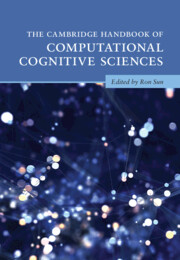Book contents
- The Cambridge Handbook of Computational Cognitive Sciences
- Cambridge Handbooks in Psychology
- The Cambridge Handbook of Computational Cognitive Sciences
- Copyright page
- Contents
- Preface
- Contributors
- Part I Introduction
- Part II Cognitive Modeling Paradigms
- Part III Computational Modeling of Basic Cognitive Functionalities
- 11 Computational Models of Categorization
- 12 Computational Cognitive Neuroscience Models of Categorization
- 13 Models of Inductive Reasoning
- 14 Analogy and Similarity
- 15 Mental Models and Algorithms of Deduction
- 16 Computational Models of Decision Making
- 17 Computational Models of Skill Acquisition
- 18 Computational Models of Episodic Memory
- 19 Computational Neuroscience Models of Working Memory
- 20 Neurocomputational Models of Cognitive Control
- 21 Computational Models of Animal and Human Associative Learning
- 22 Computational Cognitive Models of Reinforcement Learning
- Part IV Computational Modeling in Various Cognitive Fields
- Part V General Discussion
- Index
- References
18 - Computational Models of Episodic Memory
from Part III - Computational Modeling of Basic Cognitive Functionalities
Published online by Cambridge University Press: 21 April 2023
- The Cambridge Handbook of Computational Cognitive Sciences
- Cambridge Handbooks in Psychology
- The Cambridge Handbook of Computational Cognitive Sciences
- Copyright page
- Contents
- Preface
- Contributors
- Part I Introduction
- Part II Cognitive Modeling Paradigms
- Part III Computational Modeling of Basic Cognitive Functionalities
- 11 Computational Models of Categorization
- 12 Computational Cognitive Neuroscience Models of Categorization
- 13 Models of Inductive Reasoning
- 14 Analogy and Similarity
- 15 Mental Models and Algorithms of Deduction
- 16 Computational Models of Decision Making
- 17 Computational Models of Skill Acquisition
- 18 Computational Models of Episodic Memory
- 19 Computational Neuroscience Models of Working Memory
- 20 Neurocomputational Models of Cognitive Control
- 21 Computational Models of Animal and Human Associative Learning
- 22 Computational Cognitive Models of Reinforcement Learning
- Part IV Computational Modeling in Various Cognitive Fields
- Part V General Discussion
- Index
- References
Summary
Computational models of episodic memory provide tools to better understand the latent neurocognitive processes underlying retention of information about specific events from one’s life. This chapter discusses the representations, associations, and dynamics of influential models of episodic memory, with particular emphasis on models of recognition and free recall tasks. In-depth discussion and model-fitting results of four models – the retrieving effectively from memory (REM) model, the bind cue decide model of episodic memory (BCDMEM), the search of associative memory (SAM) model, and the temporal context model (TCM) – are provided to facilitate understanding of these models, as well as similarities and differences between them. Alternative modeling frameworks, including neural network models, are discussed. Throughout, the importance of context in models of episodic memory is emphasized, particularly for free recall tasks.
Keywords
Information
- Type
- Chapter
- Information
- The Cambridge Handbook of Computational Cognitive Sciences , pp. 567 - 610Publisher: Cambridge University PressPrint publication year: 2023
